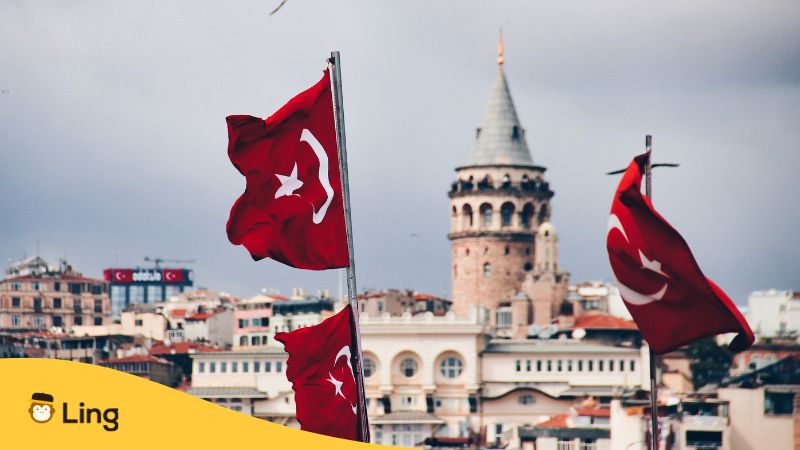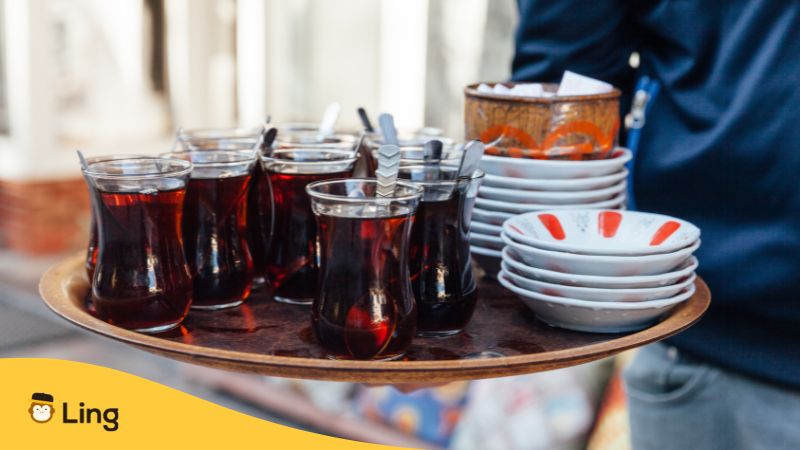If you’re a foreigner living in Turkey, you should understand Turkish traditions to blend in with the culture and people. In this blog post, I’ll mention the most important ones. So keep reading!
There are many Turkish traditions, from the evil eye to henna night, but I’ll cover the ones you’re most likely to encounter in everyday life. Knowing about them will protect you from cultural shocks and prepare you for your life ahead in Turkey. So, let’s get started!
Turkish Traditions
Below are common Turkish traditions all expats and tourists visiting Turkey should know. But before we dive in, here’s a quick reminder: You can learn Turkish from scratch by using the Ling app! It’s available on both the Play Store and App Store, and it offers a free 7-day trial for new users!

1. Strong Nationalistic Feelings
Nationalistic feelings and assets have always had a special place in Turkey. Atatürk (the founder and first president of modern Turkey) and the Turkish flag are crucial assets that elevate national feelings to the highest level. Every Turkish citizen respects and loves Atatürk, and almost everyone hangs the Turkish flag in their windows on national holidays. This is the first thing expats need to know about Turkish nationalism.
2. Sincere Greetings
We Turks can turn greetings into a flood of love compared to other countries. For example, most countries don’t have practices such as kissing on both cheeks and hugging. In addition, kissing the hands of family elders and placing them on their heads is also a sign of great respect when greeting.
3. Traditional Turkish Breakfasts
Turkish breakfast, whose fame has gone beyond the borders of the country, is perhaps one of the cultural aspects that expats love the most. Aside from the fact that Turkish breakfast tables are crowded and delicious, having lots of conversation is also part of this. Turks really love having breakfast, especially the Sunday breakfasts that last until almost the evening!
4. Turkish Hospitality Is On Another Level
You must have heard that Turkish people are very hospitable. Believe me, it’s not an exaggeration. This hospitality culture is especially widespread in Anatolia. It’s a great pleasure for Turks to host a foreigner at home and feed them with delicious food and tea. It may be one of our proudest traditions!
5. Lemon Cologne To The Guests
Lemon cologne (limon kolonyası) is one of the things that Turks offer to their guests. For example, if you eat at a restaurant, the waiter will inevitably offer you lemon cologne when you leave. Additionally, lemon cologne is often offered during home visits. It’s usually done at the entrance, sometimes at the exit, but believe me, lemon cologne is the best way to freshen up. Strangely, it makes people feel good.
6. Take Off Your Shoes Before Entering A House
In Turkish culture, you can’t enter houses with your shoes on. We take off our shoes and put on slippers at the entrance of the house. We also keep separate slippers for guests in the house, but you can also bring your own.

7. It’s Always Time For Turkish Tea
Tea has a special place in Turkish culture. It’s the must-have drink of a classic Turkish breakfast. Turkish tea has no limits. It can be served anywhere, and it’s the first thing that comes to our minds when we order a drink. It goes like this; “Ne içersin? (What do you drink)?”, “Bi bardak çay alayım. (I’ll have a glass of tea.)”
8. A Cup Of Coffee Is Remembered For 40 Years
Just like tea, Turkish coffee is the best companion to deep conversations. After breakfast, in the evening, after dinner… It doesn’t matter. However, there’s also a culture of coffee fortune-telling. You should know that almost everyone is a master in this field. You put the coffee on the plate, wait for it to cool, and then you find out what awaits you in up to 3 months.
9. Turkish Baths
Turkish bath is a tradition dating back to the Ottoman Empire. Just as the Finns have saunas, Turks have baths. The bathhouse, which you enter while wrapped in cotton cloth, is quite hot, just like saunas. You can also get a traditional massage there!
10. The Term Clean Is Exaggerated
Most Turkish women are obsessed with cleanliness. No matter how much cleaning they do, it’s never enough. I have a foreign friend who is married to a Turkish man, and when we were talking about this, she told me: “I thought I was tidy and clean until the day I started noticing water drops falling on the bathroom floor like my Turkish mother-in-law. When we were staying with her, every single day used to start with cleaning the house!”
11. Young People Kiss Elder People’s Hands
Turkish society respects elder people and family members. According to Turkish etiquette, when young people meet an elderly person, they kiss the back of their hands and touch their foreheads. This is an act that shows respect, they don’t do it to people their own age or a few years older.
Final Words
Living in Turkey as an expat who doesn’t know Turkish traditions might be challenging. That’s because Turkish culture is very different from Western culture, but this doesn’t mean you can’t adapt to it. In fact, many foreigners have lived in the country for years, and they all have one thing in common: they love living in Turkey and the Turkish people!
If you need more insight into Turkish culture and language, read other posts on Ling’s Turkish blog! And if you have any questions, share them in the comments section so I can help you as a local from Turkey!



































































